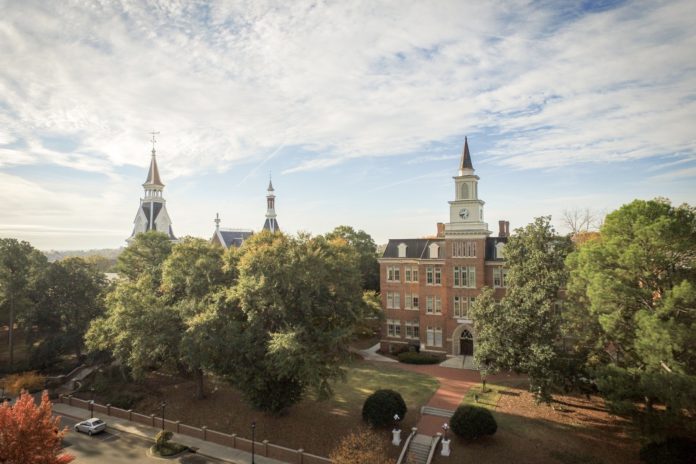By Anita Olson Gustafson, Ph.D., Dean, College of Liberal Arts and Sciences
It is no secret that higher education today faces significant challenges as universities develop a variety of plans for coping with the COVID-19 pandemic. There is no blueprint on how best to move forward. Mercer University made the conscious decision to emphasize in-person instruction this fall semester while working to make the classroom environment as safe as possible.
Last spring semester, as schools and businesses shut down, Mercer closed its campus and sent students and faculty home to continue instruction in a virtual format. With the goal being to continue in-person classes as soon as possible, faculty pivoted to remote teaching on short notice after spring break.
Traditionally, Mercer’s College of Liberal Arts and Sciences only offers a handful of online courses during the summer terms, so many faculty had to learn quickly how to deliver robust instruction remotely. Dr. Susan Codone, Director of the Center for Teaching and Learning, worked long hours to help faculty in the transition. Faculty reached out to train each other to use Zoom and to make better use of Mercer’s course management system, Canvas. New terminology became commonplace, such as “synchronous learning,” meaning live online learning taking place at regularly scheduled class times, and “asynchronous learning,” when lectures and other materials are posted so that students can access them remotely on their own time.
I was very pleased with how well the CLAS students and faculty confronted unprecedented challenges.
Dr. Jeff Pullen, Associate Professor of Mathematics, noted, “I wanted to make my virtual classes as close to my face-to-face classes as I could.” He projected his tablet screen, in addition to his face, and worked with students to fill in skeletal notes he had posted before the class started. “This setup worked well as it mimicked the usual student-teacher interactions I have teaching face-to-face.”
Ms. Libertad Aranza, Lecturer of Spanish, created clear pathways of communication with her students to motivate them and respond to their concerns. She expressed appreciation for her students as they adapted to this format and used new innovative tools to deliver her courses remotely. She also gave herself some leeway when her class did not go exactly as planned.
Professor of Chemistry Dr. Caryn Seney agreed, “We all quickly learned the need for flexibility and an extra dose of understanding… and grace.” Teaching chemistry at 8 a.m. using a remote format was particularly challenging, but according to Dr. Seney, “because I had to utilize new teaching techniques… I’ve been able to incorporate them in my on-campus course.”
The transition to online teaching was challenging and overwhelming for faculty, but even more so for students. Some students had difficulty getting access to broadband when away from campus, and others had to share computers with siblings and parents. Some might have had to balance learning heavily conceptual material remotely with picking up additional responsibilities while at home.
Dr. Pullen said that some of his students struggled partly because “of the overwhelming chaos surrounding COVID-19,” but also because students have spent their formative years learning face-to-face. He added that distractions such as Netflix and video games at times made it difficult to establish a daily routine.
Ms. Aranza reflected, “Students did great adapting to online learning… however, they preferred in-person classes because they missed interacting with classmates.”
Perhaps Dr. Seney summed it up best when she wrote, “I am grateful for resilient students – Mercerians who were (and still are) learning firsthand what it means to bend and sway but not break.”
Summer School provided an opportunity to begin a transition back to in-person classes. Faculty taught courses in Summer Session One completely online. During Summer Session Two, most courses remained online, but the CLAS offered four face-to-face courses, two in Chemistry and one each in Mathematics and Political Science. These classes were a first step in returning to classroom instruction for the fall semester, and Mercer introduced safety measures such as required masking, social distancing, temperature checking and increased sanitizing. Although the faculty were a bit nervous about teaching face-to-face, as the courses continued, concerns eased as routines developed.
Over the summer, the Provost’s Office and the Dean’s Office worked to prepare facilities and implement procedures to mitigate risk for in-person instruction. Perhaps most impressively, Mercer built its own lab that can process up to 1,000 COVID-19 tests per day, putting it at an advantage compared to many other universities. The University required traditional undergraduate students to be COVID tested before moving into campus housing or starting fall classes. It also set aside facilities where student could isolate if they tested positive and reduced classroom capacities to better spread out students. Mercer has now moved into more randomized surveillance testing of students.
This fall semester, the College of Liberal Arts and Sciences offers the vast majority of its courses face-to-face with safety protocols firmly enforced. Faculty continue to use technology to enhance the in-person experience, and science labs have been modified to reduce the number of students in lab at the same time. In addition, improved technology and high-performance cameras have been added to most classrooms, and faculty have learned how to livestream their classes to reach students who may need to isolate. Labor Day and Fall Break have been eliminated with the goal being to keep students on campus until Thanksgiving, and then to administer exams remotely in early December, allowing students to move home for the entire holiday season.
We remain optimistic that students will be able to remain on campus for a full semester to take advantage of the dynamic learning environment that is one of Mercer’s hallmarks.
To keep track of Mercer’s plans and protocols relating to COVID-19, please refer to https://www.mercer.edu/coronavirus/.










